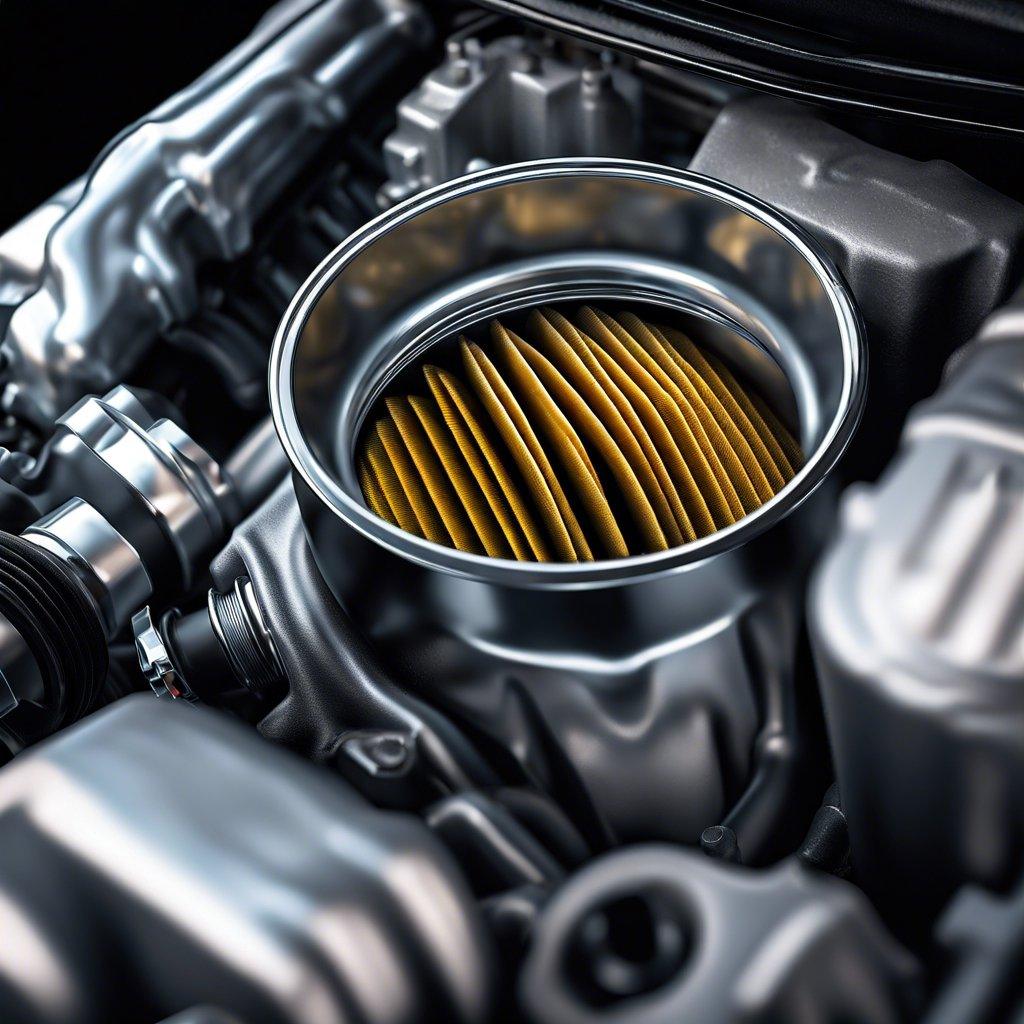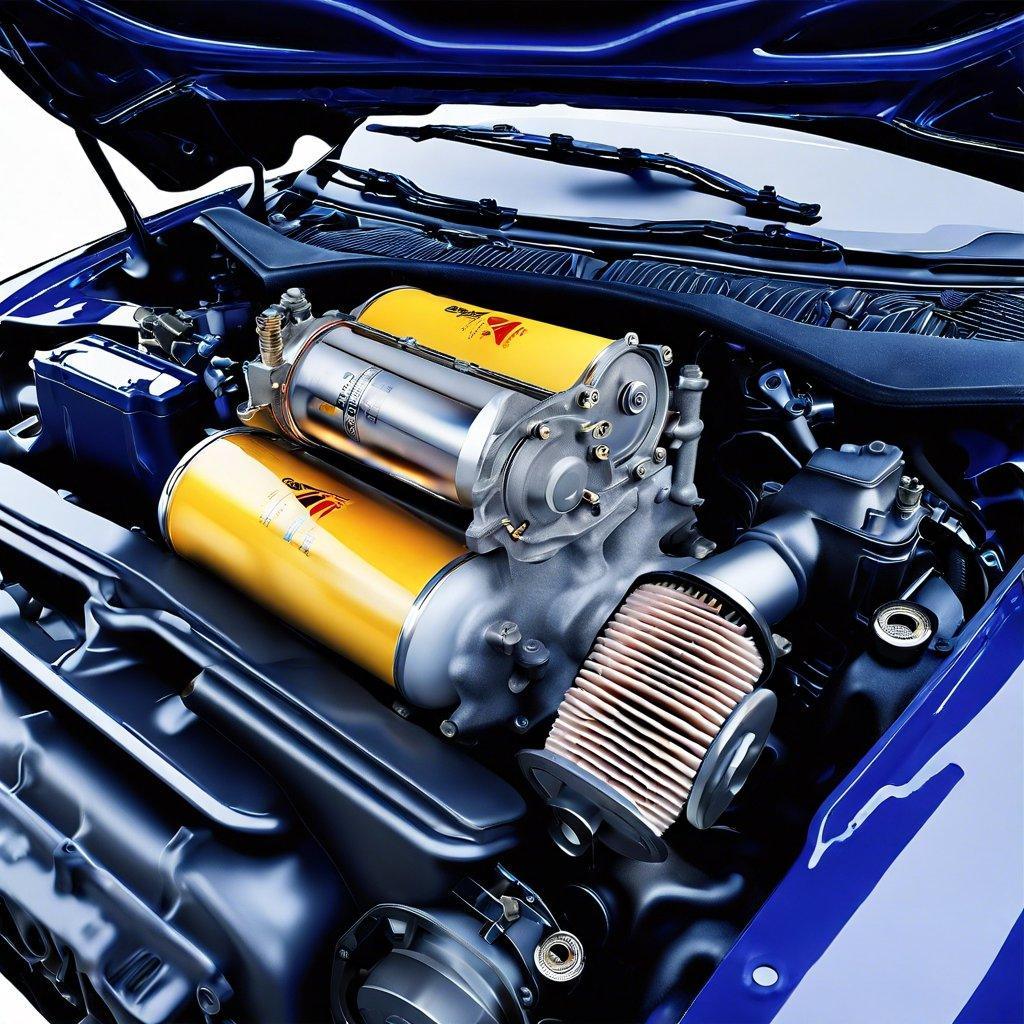Signs of a Bad Fuel Filter: Key Symptoms
Sluggish Engine Performance: A Telltale Sign of a Faulty Fuel Filter

One of the most prominent signs of a failing fuel filter is a sluggish engine performance. When the fuel filter becomes clogged or restricted, it can impede the flow of fuel to the engine, resulting in a noticeable decrease in power and responsiveness.
Reduced Acceleration: A clogged fuel filter can make it difficult for the engine to accelerate, as the restricted fuel flow limits the amount of power available. This can be particularly noticeable when attempting to merge onto a highway or climb a hill.
Hesitation and Stalling: As the fuel filter becomes increasingly obstructed, the engine may experience hesitation or even stalling, especially during idling or low-speed driving. This is a clear indication that the fuel delivery is compromised.
Reduced Fuel Efficiency: A faulty fuel filter can also lead to decreased fuel efficiency, as the engine struggles to consume the necessary amount of fuel. This can result in a noticeable drop in miles per gallon (MPG) or kilometers per liter (KPL).
Misfiring and Rough Idling: In some cases, a clogged fuel filter can cause the engine to misfire or idle roughly, as the uneven fuel distribution can disrupt the combustion process.
Addressing the Issue
If you experience any of these symptoms, it is crucial to have your vehicle’s fuel filter inspected and replaced as soon as possible. A malfunctioning fuel filter can lead to further damage to the fuel system and even the engine if left unattended.
- Regularly scheduled fuel filter replacements, as recommended by the manufacturer, can help prevent these issues and maintain optimal engine performance.
- Ensuring the use of high-quality fuel and regular fuel system cleanings can also contribute to the longevity of the fuel filter.
| Symptom | Description |
|---|---|
| Sluggish Engine Performance | A noticeable decrease in power and responsiveness due to restricted fuel flow. |
| Reduced Acceleration | Difficulty in accelerating, especially during merging or hill climbing. |
| Hesitation and Stalling | Engine hesitation or stalling, particularly during idling or low-speed driving. |
| Reduced Fuel Efficiency | A drop in miles per gallon (MPG) or kilometers per liter (KPL) due to the engine’s struggle to consume the necessary fuel. |
| Misfiring and Rough Idling | Uneven fuel distribution leading to engine misfiring and rough idling. |
By addressing these signs of a faulty fuel filter promptly, you can maintain your vehicle’s optimal performance, fuel efficiency, and overall reliability.
Frequent Misfiring: A Symptom of Fuel Filtration Woes
One of the most common signs of a failing fuel filter is frequent misfiring in the engine. When the fuel filter becomes clogged or restricted, it can impede the proper flow of fuel to the engine, leading to an uneven fuel delivery and, consequently, misfiring.
The fuel filter’s primary role is to remove contaminants and impurities from the fuel, ensuring a clean and consistent supply to the fuel injectors or carburetor. However, over time, the filter can become saturated with debris, restricting the fuel flow and causing the engine to misfire.
Misfiring can manifest in various ways, such as rough idling, hesitation during acceleration, or a noticeable drop in engine performance. These symptoms can be particularly troublesome for engineering and technology employees who rely on their vehicles for work-related transportation or equipment operation.
It is important to address a fuel filter-related misfiring issue promptly, as it can lead to further engine damage if left unresolved. Regular fuel filter replacement, as recommended by the vehicle manufacturer, can help prevent these problems and ensure the smooth, efficient operation of the engine.
Key Takeaways:
- Frequent misfiring is a common symptom of a clogged or failing fuel filter.
- A restricted fuel flow due to a dirty filter can cause uneven fuel delivery, leading to engine misfiring.
- Misfiring can result in rough idling, hesitation during acceleration, and decreased engine performance.
- Regular fuel filter replacement is essential to maintain engine health and prevent further damage.
Reduced Fuel Efficiency: The Hidden Cost of a Clogged Fuel Filter
As an engineering or technology professional, you understand the importance of maintaining your vehicle’s performance and efficiency. One often overlooked component that can significantly impact your fuel economy is the fuel filter. A clogged or faulty fuel filter can lead to a hidden, yet significant, cost: reduced fuel efficiency.
Understanding the Role of the Fuel Filter
The fuel filter is a critical component in your vehicle’s fuel system, responsible for removing impurities and contaminants from the fuel before it reaches the engine. Over time, as the filter becomes clogged with debris, it restricts the flow of fuel, resulting in a range of problems that can ultimately lead to decreased fuel efficiency.
Symptoms of a Clogged Fuel Filter
- Decreased fuel economy: As the fuel filter becomes clogged, the engine has to work harder to draw fuel from the tank, leading to a noticeable drop in your vehicle’s miles per gallon (MPG).
- Hesitation or stalling: A clogged filter can cause the engine to hesitate or even stall, particularly during acceleration or under heavy load.
- Difficulty starting: A restricted fuel flow can make it challenging to start the engine, especially when the engine is warm.
- Reduced power and acceleration: The engine’s inability to draw sufficient fuel can result in a noticeable loss of power and slower acceleration.
The Hidden Cost of Reduced Fuel Efficiency
While the direct cost of a clogged fuel filter may be relatively low, the hidden cost of reduced fuel efficiency can be significant over time. Decreased MPG means you’ll be spending more on fuel, which can quickly add up, especially for high-mileage drivers or those with long commutes.
| Fuel Efficiency Impact | Potential Cost |
|---|---|
| 1 MPG decrease | $100 – $300 per year (based on average annual mileage and fuel prices) |
| 2 MPG decrease | $200 – $600 per year (based on average annual mileage and fuel prices) |
| 3 MPG decrease | $300 – $900 per year (based on average annual mileage and fuel prices) |
As an engineering or technology professional, it’s essential to be aware of the hidden costs associated with a clogged fuel filter and take proactive steps to maintain your vehicle’s fuel system for optimal performance and efficiency.
Difficulty Starting the Engine: A Red Flag for Fuel Filter Replacement
One of the most prominent signs of a clogged or failing fuel filter is difficulty starting the engine. When the fuel filter becomes obstructed, it restricts the flow of fuel to the engine, making it challenging to start the vehicle. This issue can manifest in several ways:
- Slow Cranking: The engine may take longer than usual to turn over and start, as the fuel pump struggles to push fuel through the blocked filter.
- Intermittent Starts: The engine may start and then stall shortly after, as the restricted fuel flow is insufficient to maintain running.
- Frequent Stalling: The engine may stall frequently, especially when idling or under load, due to the inadequate fuel supply.
It’s important to address this issue promptly, as a clogged fuel filter can lead to further problems, such as decreased fuel efficiency, power loss, and even engine damage if left unresolved.
| Symptom | Potential Cause |
|---|---|
| Difficulty Starting the Engine | Clogged or Failing Fuel Filter |
| Slow Cranking | Restricted Fuel Flow |
| Intermittent Starts | Insufficient Fuel Supply |
| Frequent Stalling | Inadequate Fuel Flow |
By recognizing these signs and addressing a problematic fuel filter promptly, engineering and technology employees can help maintain the optimal performance and reliability of their vehicles.




Post Comment